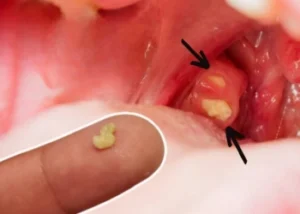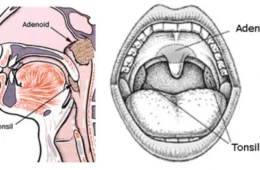
Tonsil stones affect many people, causing discomfort and embarrassment from bad breath. At EliteFixDenture, we care about your overall oral health. This guide draws from trusted sources to help you understand and manage tonsil stones.
What Are Tonsil Stones?
Tonsil stones, or tonsilloliths, form as small, hard lumps in your tonsils. These pebble-like deposits consist of calcified minerals, food particles, bacteria, and dead cells trapped in tonsil crevices called crypts. They often appear white or yellow and range from tiny specks to larger masses.
Most tonsil stones cause no harm. However, they can lead to noticeable issues if they grow or multiply.
Common Causes of Tonsil Stones
Debris builds up in tonsil crypts, where it hardens over time. Bacteria and fungi contribute to this process, creating a biofilm that calcifies with calcium.
Factors that increase risk include:
- Chronic tonsillitis or frequent infections
- Poor oral hygiene, allowing more debris to accumulate
- Enlarged tonsils with deeper crypts
- Dehydration, which thickens saliva and traps particles
In Chicago’s dry winter air, staying hydrated becomes even more crucial to prevent buildup in Lincoln Park or Lakeview neighborhoods.
Symptoms of Tonsil Stones
You might not notice small tonsil stones. Larger ones trigger clear signs. Bad breath tops the list, as bacteria produce a foul odor.
Watch for these symptoms:
- Persistent sore throat or difficulty swallowing
- Ear pain or a chronic cough
- Swollen tonsils with visible white spots
- Metallic taste in the mouth
If symptoms persist, they could signal an infection.
How Doctors Diagnose Tonsil Stones
Your provider spots tonsil stones during a simple throat exam. They may use a light to check crypts. In rare cases, imaging like a CT scan confirms hidden stones.
Dentists often discover them during routine checkups, linking them to bad breath concerns.
Safe Home Removal Methods
Many people dislodge tonsil stones at home. Start gently to avoid injury.
Try these steps:
- Gargle vigorously with warm salt water (1/2 teaspoon salt in 8 ounces water) to loosen debris.
- Cough forcefully to expel stones naturally.
- Use a water flosser on low pressure to flush crypts.
- Gently press with a clean cotton swab, but stop if bleeding occurs.
Avoid sharp tools. If stones recur, professional help ensures safe care.
When to Seek Professional Help
See a doctor if home methods fail or symptoms worsen. Infections may need antibiotics. For chronic cases, options include laser resurfacing or tonsil removal.
At EliteFixDenture in Chicago, Dr. Aziz Liaquat specializes in extractions and can address related oral issues. During winter, schedule a visit in Lincoln Park to tackle seasonal dryness early.
| Treatment Type | Method | Best For | Potential Drawbacks |
| Home Remedies | Salt water gargle, coughing | Small, occasional stones | May not reach deep crypts |
| Professional | Manual removal, antibiotics | Larger or infected stones | Requires office visit |
| Surgical | Tonsillectomy or cryptolysis | Frequent, severe cases | Recovery time needed |
Learn more about tonsil stones from Cleveland Clinic.
Prevention Strategies for Tonsil Stones
Prevent tonsil stones with daily habits. Brush twice daily, floss, and clean your tongue to reduce debris.
Key tips include:
- Drink plenty of water, especially in Chicago’s chilly winters
- Quit smoking to lower infection risk
- Gargle after meals to clear food particles
- Maintain regular dental visits for early detection
These steps keep your throat healthy year-round.
Explore prevention details on Healthline.
FAQs: Tonsil Stones
Q: Do tonsil stones hurt?
A: Small ones rarely do, but larger stones can cause throat pain or swelling.
Q: Can kids get tonsil stones?
A: Yes, though they’re more common in teens and adults with larger tonsils.
Q: Are tonsil stones contagious?
A: No, they form from trapped debris, not spread like infections.
Q: How long do tonsil stones last?
A: Many dislodge naturally within days; others need removal.
Q: Can diet affect tonsil stones?
A: Sugary or dairy-heavy diets may increase debris buildup.
Q: Is surgery always needed?
A: Rarely—most respond to home care or minor procedures.
Q: Do they cause cavities?
A: Indirectly, through bad breath bacteria that harm teeth.
Q: How does winter weather play a role?
A: Dry air in Lakeview winters thickens mucus, trapping more particles.
This article provides informational content only and does not replace professional medical advice. Consult a healthcare provider for personalized guidance.
For expert dental care in Chicago, visit EliteFixDenture.com.
Reviewed by Dr. Aziz Liaquat, Implant Dentistry





